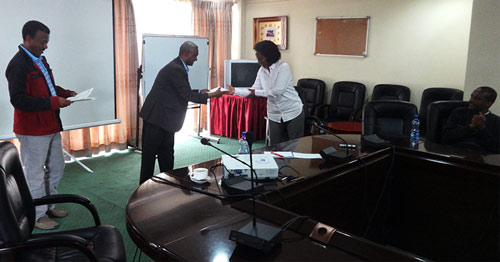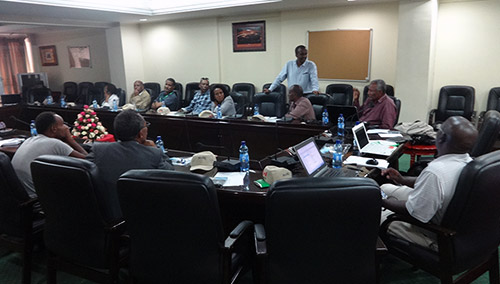Ethiopian Seed Company Managers Express Interest in QPM, Seek CIMMYT Support
By Seifu Mahifere
Managers of private and public seed companies in Ethiopia have expressed interest to produce and broadly market quality protein maize (QPM) seed, provided that they get technical and other necessary support from NuME.

Ms. Elsa Asfaha (right), Manager, Alamata Agroprocessing, receives her certificate from Dr. Tafesse Gebru (middle), the Chief Executive Officer of the Ethiopian Seed Enterprise, while Dr Adefris Teklewold (left), NuME Project Leader, looks on.
The managers attended three-day training on Seed Business Management organized by NuME from March 23–25 in Addis Ababa, Ethiopia. Seed sector development is one of the core components of NuME. The project periodically organizes such training with the objective of improving the capacity of the Ethiopian seed sector to produce QPM seeds of the required quantity and quality as one of the prerequisites for sustainable adoption of QPM.
With the right training and approaches, there is no reason why you cannot become the future [seed production] giants of Ethiopia and East Africa.”
In his keynote address, Dr. Adugna Wakjira, the Deputy Director General of the Ethiopian Institute of Agricultural Research, appreciated the project for organizing the training. He noted that “many challenges are involved in seed production and delivery systems and producers need to upgrade their capacities and knowhow to overcome these challenges and deliver the required quantity and quality of seeds at affordable prices and at the right time to smallholder farmers.”
“It is thus critical that seed companies, both public and private, enhance their skills, including marketing knowhow, so as to be able to engage in the QPM value chain in a productive and profitable way,” Wakjira added.

The training in progress.
In an interactive question-and-answer session, participants said they were ready “to help in the project’s noble objective of improving food and nutritional security of Ethiopians, especially young children, but there are many challenges, one of which is technical and skill gaps in modern seed production.”
”By forming a strong partnership with the NuME project, seed companies can produce certified seeds of QPM in a step-by-step approach by first producing at smaller levels and increasing the volume of production through time, as the awareness of farmers about the technology increases,” said Dr. Benti Tolessa, the Managing Director of Anno Agro industry PLC. He also said there was already high demand for BHQPY545 (a QPM variety) in East Wollega and West Shewa where his company widely operates.
Dr. Tafesse Gebru, the Chief Executive Officer of the Ethiopian Seed Enterprise, said that the volume of QPM seed produced last year and this year could be considered as a great success compared to seed production trends for other newly released conventional maize varieties. This success was due to the strong partnership between the project and seed companies. “A longer gestation period is normally required for a new variety to be produced in higher volumes,” he added.
Dr. Adefris Teklewold, the NuME Project Leader, briefed the participants on the background of the project and the many accomplishments registered so far and pledged that “NuME will do all it can to address all challenges faced by seed companies with respect to producing QPM seed.”
Topics covered in the training included:
- basics of maize breeding variety testing and product release
- distinguishing characteristics of inbred lines, hybrids and open pollinated varieties (OPVs)
- descriptor and distinct, uniform and stable (DUS) testing
- managing hybrid and OPV seed production
- the seed business cycle and value chain
- planning seed production and seed rate calculations
- seed growers’ selection and support
- managing growers and contracts
- seed certification standards and inspection procedures
- developing marketing, promotion and sales strategies
“All issues and concerns in the seed value chain need to be considered, including seed quality, branding as well as maize lethal necrosis [MLN] disease, which is a formidable challenge for East Africa,” Adefris noted.
The training was held in an interactive fashion and included both theoretical and practical exercise sessions. A Maize Hybrid Seed Production Manual produced by CIMMYT scientists and the popular CIMMYT seed book (authored by John MacRobert) titled Seed Business Management in Africa were given to participants.
The training was facilitated by CIMMYT staff: Dr. Dagne Wegary and Maize Seed Systems Specialists, Dr. Mosisa Regasa and Dr. James Gethi.
Other presenters included Mr. Daniel Mekonnen, Director of Plant Variety Release, Protection and Seed Quality Control, Ethiopian Ministry of Agriculture; and Yonnas Sahlu, a seed systems specialist at the Alliance for a Green Revolution in Africa, Ethiopia office.
“With the right training and approaches, there is no reason why you cannot become the future [seed production] giants of Ethiopia and East Africa,” Dr. Mosisa told the participants at the end of the training.
